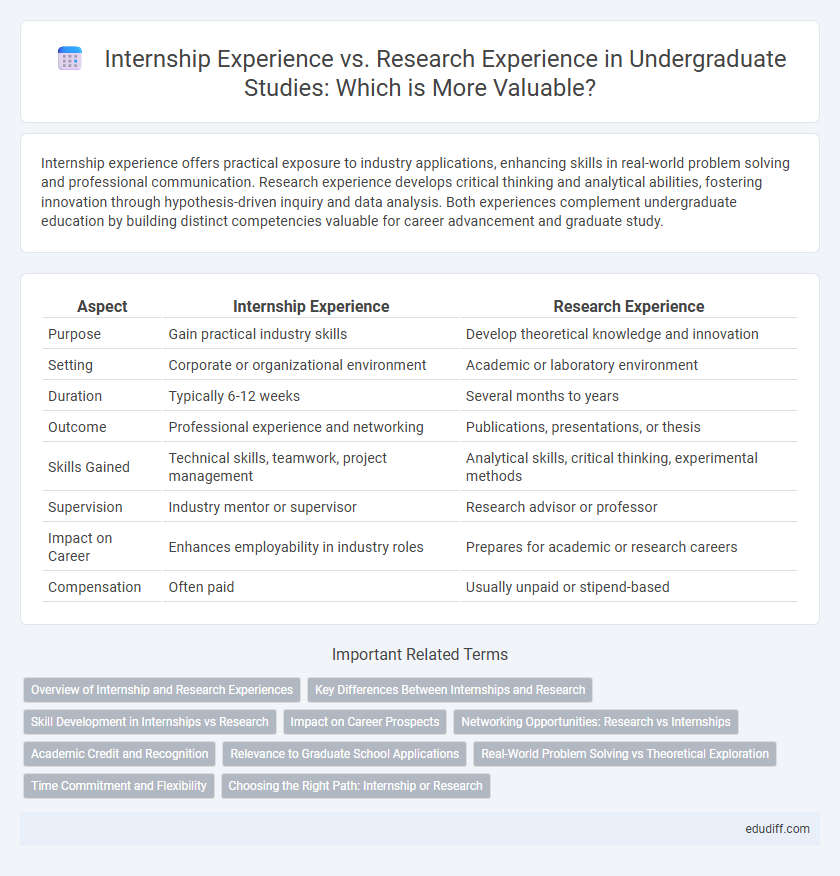Internship experience offers practical exposure to industry applications, enhancing skills in real-world problem solving and professional communication. Research experience develops critical thinking and analytical abilities, fostering innovation through hypothesis-driven inquiry and data analysis. Both experiences complement undergraduate education by building distinct competencies valuable for career advancement and graduate study.
Table of Comparison
| Aspect | Internship Experience | Research Experience |
|---|---|---|
| Purpose | Gain practical industry skills | Develop theoretical knowledge and innovation |
| Setting | Corporate or organizational environment | Academic or laboratory environment |
| Duration | Typically 6-12 weeks | Several months to years |
| Outcome | Professional experience and networking | Publications, presentations, or thesis |
| Skills Gained | Technical skills, teamwork, project management | Analytical skills, critical thinking, experimental methods |
| Supervision | Industry mentor or supervisor | Research advisor or professor |
| Impact on Career | Enhances employability in industry roles | Prepares for academic or research careers |
| Compensation | Often paid | Usually unpaid or stipend-based |
Overview of Internship and Research Experiences
Internship experiences provide undergraduate students with practical industry exposure, enabling them to apply theoretical knowledge in real-world settings and develop professional skills. Research experiences involve systematic investigation, fostering critical thinking, data analysis, and academic inquiry essential for scientific advancement. Both experiences complement each other by enhancing problem-solving abilities and expanding career opportunities in diverse fields.
Key Differences Between Internships and Research
Internship experience emphasizes practical industry skills and professional networking, providing hands-on exposure to real-world workplace environments, deadlines, and team collaboration. Research experience focuses on developing analytical thinking, problem-solving abilities, and deep subject expertise through experimentation, data analysis, and scholarly inquiry. Key differences include the goal orientation--internships aim for application and business impact, while research prioritizes knowledge creation and methodological rigor.
Skill Development in Internships vs Research
Internship experience hones practical skills such as communication, teamwork, and problem-solving within real-world work environments, enhancing professional adaptability. Research experience develops analytical thinking, critical evaluation, and specialized knowledge through methodical investigation and experimentation. Internships often provide hands-on exposure to industry tools and workflows, while research emphasizes independent inquiry and data interpretation.
Impact on Career Prospects
Internship experience offers practical skills and industry exposure that enhance employability and networking opportunities, directly influencing career prospects by demonstrating real-world problem-solving abilities to employers. Research experience develops critical thinking, analytical skills, and subject matter expertise, which are highly valued in academia and R&D-oriented careers. Both experiences significantly boost resumes, but internships often lead to immediate job placements while research fosters long-term academic and specialized career pathways.
Networking Opportunities: Research vs Internships
Internship experience often provides extensive networking opportunities by connecting undergraduates with industry professionals, mentors, and potential employers through hands-on projects and corporate events. Research experience, while more specialized, allows students to build deep connections with academic advisors, graduate students, and conference attendees, fostering scholarly collaborations. Both pathways enhance professional networks, but internships typically offer broader exposure to diverse career paths and real-world environments.
Academic Credit and Recognition
Internship experience offers practical skills and industry exposure while often providing academic credit based on work hours and supervisor evaluations. Research experience, valued for its contribution to academic knowledge, frequently leads to formal recognition such as publications or conference presentations, enhancing a student's scholarly profile. Both experiences contribute to academic growth, but research involvement typically holds greater weight in academic credit systems and honors.
Relevance to Graduate School Applications
Internship experience provides practical skills and industry exposure that demonstrate applied knowledge and professional readiness to graduate admissions committees. Research experience showcases critical thinking, problem-solving abilities, and familiarity with academic inquiry, which are highly valued for programs emphasizing scholarly work. Graduate schools often prioritize research experience for research-intensive degrees, while internships may be more relevant for professional or applied graduate programs.
Real-World Problem Solving vs Theoretical Exploration
Internship experience offers undergraduates hands-on exposure to real-world problem solving by engaging with industry-specific challenges and applying practical skills in dynamic work environments. Research experience emphasizes theoretical exploration, allowing students to investigate complex concepts, develop hypotheses, and contribute to academic knowledge through systematic study. Both experiences enhance critical thinking, but internships prioritize practical application while research fosters deep analytical skills.
Time Commitment and Flexibility
Internship experience typically requires a fixed schedule with set hours, providing structured time commitments that mirror professional work environments. Research experience often offers more flexibility, allowing undergraduates to allocate hours based on project needs and academic responsibilities. Time commitment in internships is usually more intensive over shorter periods, while research can extend over a longer duration with varied workloads.
Choosing the Right Path: Internship or Research
Choosing between internship experience and research experience depends on your career goals and field of study. Internships provide practical, hands-on experience and professional networking opportunities, ideal for students aiming to enter industry roles. Research experience develops critical thinking, analytical skills, and subject matter expertise, benefiting those interested in academia or advanced studies.
Internship Experience vs Research Experience Infographic

 edudiff.com
edudiff.com